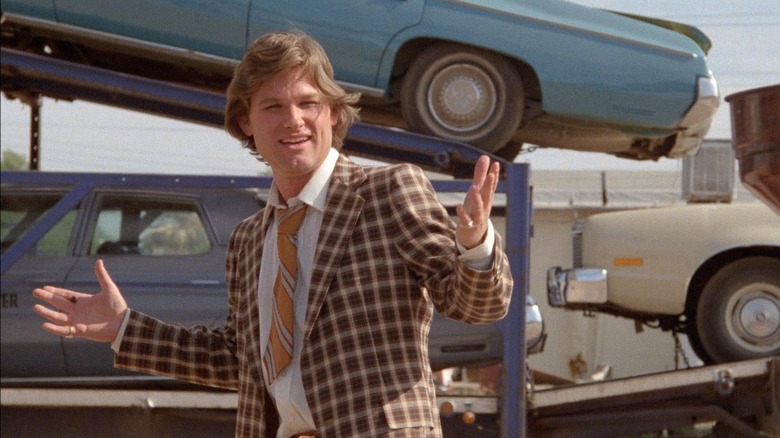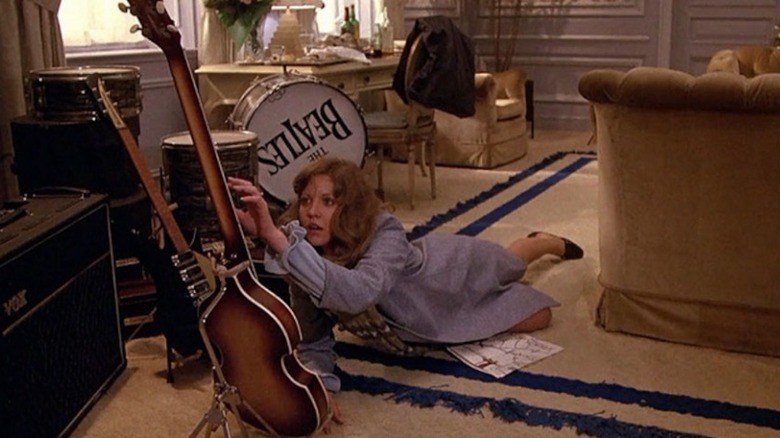Studio Execs Nearly Killed Robert Zemeckis' Career Before It Began
Robert Zemeckis couldn't have asked for a more propitious start to his filmmaking career. Soon after graduating from University of Southern California's School of Cinematic Arts in 1973, Zemeckis, on the strength of his award-winning student film, found a powerful young mentor in Steven Spielberg. The "Jaws" maestro was Universal Pictures' in-house wunderkind, so when he flipped out over "I Wanna Hold Your Hand," a raucous comedy, written by Zemeckis and his creative partner Bob Gale, about a trio of young girls desperate to attend the live taping of The Beatles' first performance on "The Ed Sullivan Show," the studio greenlit it — even though Zemeckis was completely untested as a feature director.
Five years later, Zemeckis' was very close to finished in Hollywood.
With a budget of $2.8 million, "I Wanna Hold Your Hand" wasn't considered a gamble. And when it lost money for Universal, the studio didn't sweat it. But when Zemeckis and Gale followed this up with the screenplay for Spielberg's first critical misfire in "1941" and delivered a commercial dud for Columbia Pictures with their mean-spirited sophomore effort "Used Cars," they were viewed as a bad-luck albatross around their benefactor's neck. Spielberg needed to cut bait, and these guys needed to make a hit or find another line of work.
Zemeckis finally scored a hit as a director in 1984 with "Romancing the Stone," and nailed the blockbuster big time the following year with Gale via "Back to the Future." 40 years later, Zemeckis is considered a visionary on par with his mentor, but those early missteps came very close to wiping him out. And their initial failure taught him a crucial lesson about movie marketing and the vicissitudes of studio filmmaking.
How Zemeckis learned the art of the sell
In a 2013 interview with DGA Quarterly, Zemeckis was asked about his "rocky start" in the film business. Though I take issue with his categorization of "I Wanna Hold Your Hand" and "Used Cars" as "absolute failures at the box office" (the former made $1.9 million, while the latter did $12.7 million on an $8 million budget), they were expected to perform much better given Spielberg's name on the marketing materials.
The disappointment of "I Wanna Hold Your Hand" was especially confounding for Zemeckis because it tested spectacularly well. He thought he'd made a hit. The studio, however, let him and the film down.
As Zemeckis told DGA Quarterly:
"The biggest lesson I learned on both of those projects was that a filmmaker's job isn't done when you're finished making the movie. You have to really get involved in the marketing. I still remember the first marketing meeting for 'I Wanna Hold Your Hand' where this guy said, 'So, what do you want us to do?' I thought, 'Uh, oh, this is a thing, I have to go home and start thinking of some TV spots.' I realized then that the studio really wasn't some big happy family where everybody was watching everybody else's back. Just because you were making a movie at a studio didn't mean the studio had any interest in it."
"Used Cars" was a trickier sell as an acerbic satire of capitalism sandwiched in between the July 1980 release dates of the straightforwardly silly "Airplane!" and "Caddyshack," but it and "I Wanna Hold Your Hand" are now considered early-career triumphs for Zemeckis. And he most certainly applied what he learned from those disappointments to the selling of his movies going forward. As for whether that was a good thing, watch the trailer for Zemeckis' upcoming "Here" and you tell me.

